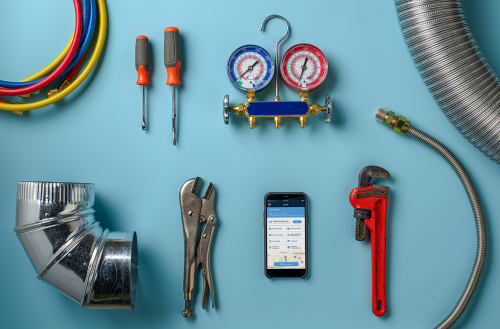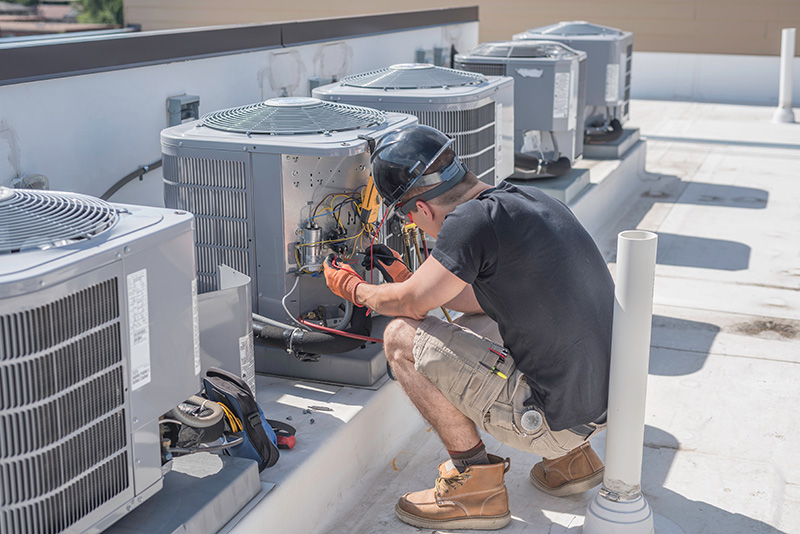Trust DMAKS HVAC for Expert Heating and Cooling Support.
Trust DMAKS HVAC for Expert Heating and Cooling Support.
Blog Article
Energy-Efficient A/c Equipments to Save Money On Utility Bills
As energy expenses continue to climb, the relevance of energy-efficient HVAC systems becomes significantly obvious. These systems not only assure significant cost savings on utility expenses however likewise contribute to an extra lasting future by lessening energy usage.
Advantages of Energy-Efficient Cooling And Heating Systems
Energy-efficient HVAC systems offer many advantages that prolong beyond plain expense financial savings. By taking in less power, these systems contribute to decrease greenhouse gas exhausts, aiding to fight climate change and advertise sustainability.
In addition, energy-efficient HVAC systems often provide boosted comfort levels. Most of these systems include innovative modern technology that enables far better temperature control and boosted air top quality (DMAKS HVAC). This leads to a much healthier indoor atmosphere, which is especially essential for individuals with allergic reactions or respiratory system problems
In addition, spending in energy-efficient heating and cooling systems can enhance residential property value. As more consumers focus on energy effectiveness, homes and buildings equipped with these systems might draw in greater proposals in the real estate market.
Types of Energy-Efficient Heating And Cooling Options
Exactly how can property owners and companies choose the most ideal energy-efficient a/c options for their needs? The marketplace provides a variety of energy-efficient HVAC systems, each developed to boost comfort while lessening energy usage.
One choice is the variable refrigerant circulation (VRF) system, which successfully manages the temperature level in numerous zones within a structure. This system adapts its refrigerant circulation to match the preferred temperature level, causing significant power cost savings.
An additional popular option is geothermal heat pumps, which utilize the planet's secure temperature to heat and great spaces. By transferring warm to and from the ground, these systems show outstanding efficiency, specifically in moderate climates.
In addition, ductless mini-split systems provide an energy-efficient alternative for homes doing not have ductwork. These systems permit for zone-specific cooling and heating, reducing power waste in vacant locations.
Lastly, high-efficiency heaters and ac system, with innovative SEER and AFUE scores, supply dependable climate control while consuming much less energy than traditional designs. By examining these options, house owners and services can choose a cooling and heating system customized to their specific demands and energy effectiveness goals.
Key Attributes to Consider

Next, examine the sort of compressor utilized in the system. DMAKS HVAC. Variable-speed compressors can readjust their outcome to match the home heating or cooling need, bring about improved comfort and power financial savings contrasted to single-speed versions. Additionally, search for systems outfitted with clever thermostats that provide programmable settings and remote access, enabling for much better control over power consumption
One more critical attribute is the system's air filtration capability. High-efficiency filters can enhance indoor air top quality and lower power intake by making certain the system runs efficiently. Take into consideration the kind of refrigerant made use of; modern systems often use environmentally friendly cooling agents that have a lower environmental influence.
Finally, make sure that the system works with zoning technology, which permits tailored temperature level control in different areas of your home, enhancing convenience while minimizing power use.
Tips for Picking the Right System


Following, take into consideration power effectiveness ratings, particularly the Seasonal Energy Effectiveness Ratio (SEER) for cooling systems and the Annual Fuel Utilization Efficiency (AFUE) for heating unit. Higher scores suggest higher efficiency, which can result in considerable cost savings on utility bills with time.
Additionally, evaluate the kind of HVAC system that finest matches your lifestyle and budget plan. Options consist of main air conditioning, ductless mini-splits, and heatpump, each with its own set of advantages and drawbacks.
Don't overlook the significance of proper installment and sizing; an improperly sized system can cause inadequacies and increased wear. Lastly, seek advice from an expert HVAC service provider to obtain experienced recommendations customized to Our site your home's distinct requirements. This thorough method will certainly ensure that you select an energy-efficient HVAC system that meets your demands imp source and budget plan successfully.
Upkeep for Ideal Effectiveness
When the ideal heating and cooling system remains in location, recurring upkeep comes to be crucial to ensuring optimum effectiveness and longevity. A well-kept system runs better, leading to lower energy intake and lowered utility costs. Routine examinations and tune-ups must be arranged at the very least two times a year-- once before the air conditioning season and as soon as before the home heating season.

Home owners must also be alert concerning checking their HVAC system's efficiency. Uncommon sounds, changing temperatures, or enhanced power bills can show underlying concerns that require instant focus. By attending to these worries without delay, property owners can stop costly repair work and prolong the life-span of their systems.
Buying an upkeep plan with a qualified professional not only boosts efficiency yet also gives satisfaction, knowing that find more the system is running at its finest. DMAKS HVAC. Routine upkeep is for that reason crucial for maintaining energy effectiveness and lowering general operational prices
Final Thought
To conclude, energy-efficient HVAC systems present a practical service for lowering energy bills while boosting convenience and air high quality. By incorporating advanced innovations and alternatives such as geothermal heatpump and ductless mini-splits, homeowner can achieve substantial energy cost savings and add to ecological sustainability. Cautious consideration of system functions and ongoing upkeep additionally guarantees optimal efficiency, making energy-efficient systems a prudent investment for both financial and environmental benefits.
Report this page